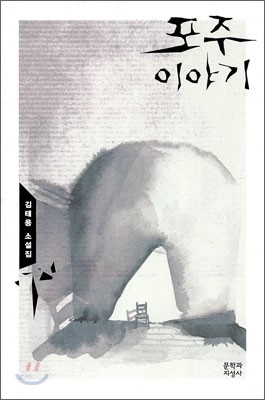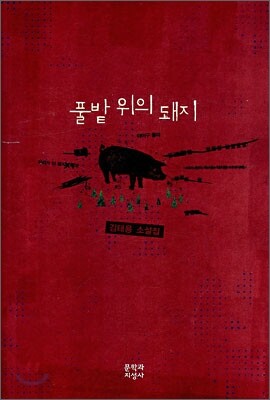1. 도입부
김태용(1974)은 대한민국의 작가이다.
2. 생애
김태용은 1974년 서울에서 출생했다. 숭실대학교 문예창작과를 졸업했다. 대한민국의 계간문예지 『세계의문학』 2005년 봄호에 단편소설 「오른쪽에서 세 번째 집」을 발표하며 등단했다. 한국일보문학상을 수상했다.
3. 작품세계
김태용의 소설은 기괴하고 그로테스크하다. 그의 첫 소설집의 표제작 「풀밭 위의 돼지」에는 풀밭 위에 아내와 남편과 돼지가 나란히 누워 있다가 돼지가 남편의 몸 위를 뛰어넘어 아내의 옆으로 가는 장면이 있다. 아내는 돼지가 싫지 않은 눈치다. 아내와 남편과 돼지가 한 풀밭에 누워 엉겨 있는 모습에 대한 묘사가 묘한 성적 긴장감을 불러일으키는 동시에 ‘관계’에 중점이 맞춰졌던 전통적인 가족 서사를 해체한다.
이런 전통적 서사의 해체는 글쓰기에 대한 김태용의 독특한 인식에서 나온다. 김태용의 많은 소설들은 글쓰기 자체에 관한 것들이다. 그의 두 번재 소설집의 표제작인 「포주 이야기」의 화자인 포주는 ‘나는 포주였다’로 시작하는 유서를 쓰면서 다음 문장이 떠오르지 않아 괴로워한다. 이 무능한 화자는 곧 작가의 분신이다. 전직 포주인 화자는 무의탁 독거노인을 돌보는 봉사활동을 나온 대학생에게서 처음 한글을 배운 뒤로 내적 분열을 일으킨다. 글을 알기 전까지는 포주로 살아온 삶의 의미에 대해서 생각하려는 욕망도 없던 화자는 “글을 쓸수록 나의 죄는 점점 부풀려지고 가중되어가는 것만 같다. 글 속에 은폐된 더 고약한 죄의 이력이 나를 괴롭힌다. 이상하게도 멈출 수가 없다. 기억을 불러내어 글을 쓸수록 기억에서 멀어지는 것만 같다”고 고백하는데, 글에 대한 이러한 불신은 글에 대해 품은 작가 자신의 불신이기도 하다.
글쓰기에 대한 김태용의 불신은 앞 문장의 의미를 해체하는 문장들의 연쇄라는 독특한 형택를 낳는다. 뚜렷한 서사를 제시하지 않고 이야기 맥락의 전후를 일부러 해치는 동어반복과 단절, 단어의 의미를 재구성하고 무의미하게 만드는 작업 등이 김태용 소설의 두드러지는 특징이다.
4. 주요 작품
벌거숭이들 (2014)
포주이야기 (2012)
숨김없이 남김없이 (2010)
풀밭 위의 돼지 (2007)
5. 수상 내역
한국일보문학상, 2008
6. 주석
문학과지성사 홈페이지, 2017.5.10.에 확인
http://moonji.com/book/5823/
Kim Tae-yong
Intro
Kim Tae-yong (born 1974) is a South Korean writer.
Life
Kim Tae-yong was born in Seoul in 1974. He graduated in creative writing from Soongsil University. He began his literary career when his short story “Oreunjjok-eseo sebeonjjae jib” (오른쪽에서 세 번째 집 The Third House from the Right) was published in the 2005 spring issue of the quarterly literary magazine Segyeuimunhak. He has won the Hankook Ilbo Literary Award.
Writing
Kim Tae-yong’s works are weird and grotesque. The title story of his first collection, “Pulbat wi-ui dwaeji” (풀밭 위의 돼지 The Pig on the Grass), has a scene where a wife, a husband, and a pig are lying next to one another on the grass. The pig then jumps over the husband’s body and goes next to the wife. The wife does not show that she dislikes this. Such depiction of the wife, the husband, and the pig lying and tangled on the grass, evokes strange sexual tension, while also deconstructing the traditional family narrative that focuses on ‘relationships’.
Such deconstruction of traditional narratives comes from Kim Tae-yong’s unique perspective on writing. Many of Kim Tae-yong’s stories are about writing itself. In the title story of his second collection “Poju iyagi” (포주 이야기 A Pimp’s Story), the pimp, who is the narrator, starts writing a will with the sentence ‘I was a pimp’, and struggles to write the next sentence. The incapable pimp is the alter ego of the writer. The narrator who used to be a pimp, goes under inner conflict after learning how to write from a university student who had come out as a volunteer for the elderly with not relatives. The narrator had never even had the desire to think about the meaning of his life as a pimp before learning to write. He confesses that “as I write, I feel that my sin is getting bigger, and heavier. The history of more and more wicked sins concealed among the words is torturing me. Strangely, I cannot stop. I feel that I am getting further from my memories as I am calling upon them to write.” Such distrust he has for writing can also stand for the distrust that the author has for writing.
Kim Tae-yong’s distrust for writing gives rise to a unique form of a repetition of sentences that deconstruct the meaning of the sentence that comes before each one. This is a prominent characteristic of Kim Tae-yong’s works, where a clear narrative is not given, there are repetition of the same word and gaps that intentionally damage the story’s context, as well as writing that reconstructs the meaning of a word, or give it no meaning.
Works
Beolgeosung-ideul (벌거숭이들 The Naked), 2014.
Poju iyagi (포주 이야기 A Pimp’s Story), 2012.
Sumgimeopsi namgimeopsi (Without Hiding, Without a Trace), 2010.
Pulbat wi-ui dwaeji (풀밭 위의 돼지 The Pig on the Grass), 2007.
Awards
Hankook Ilbo Literary Award, 2008.




